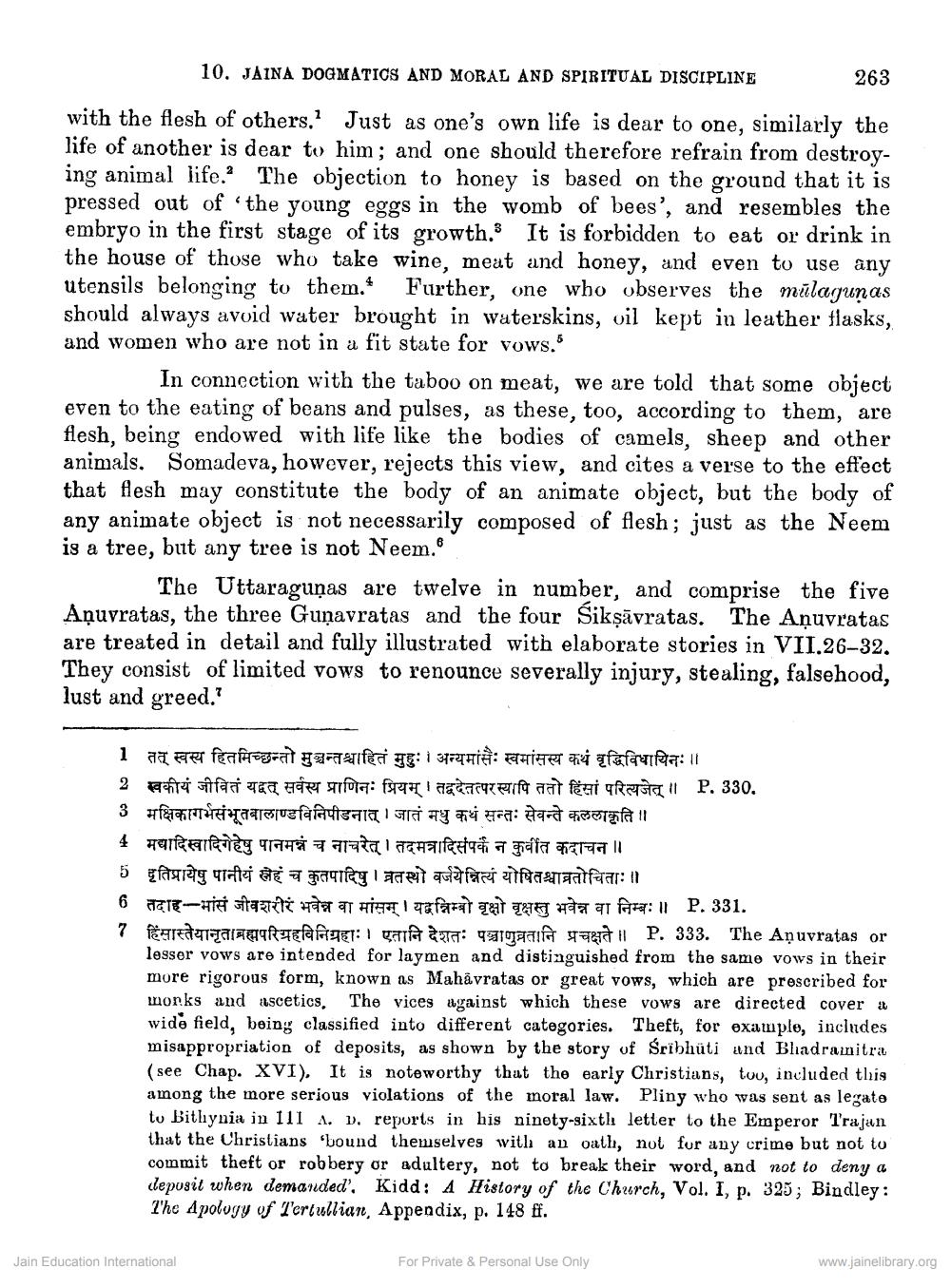________________
10. JAINA DOGMATICS AND MORAL AND SPIRITUAL DISCIPLINE
263
with the flesh of others. Just as one's own life is dear to one, similarly the life of another is dear to him; and one should therefore refrain from destroying animal life. The objection to honey is based on the ground that it is pressed out of the young eggs in the womb of bees', and resembles the embryo in the first stage of its growth. It is forbidden to eat or drink in the house of those who take wine, meat and honey, and even to use any utensils belonging to them. Further, one who observes the mülagunas should always avoid water brought in waterskins, oil kept in leather flasks, and women who are not in a fit state for vows.
In connection with the taboo on meat, we are told that some object even to the eating of beans and pulses, as these, too, according to them, are flesh, being endowed with life like the bodies of camels, sheep and other animals. Somadeva, however, rejects this view, and cites a verse to the effect that flesh may constitute the body of an animate object, but the body of any animate object is not necessarily composed of flesh; just as the Neem is a tree, but any tree is not Neem.
The Uttaraguņas are twelve in number, and comprise the five Aņuyratas, the three Guņavratas and the four Sikşāvratas. The An are treated in detail and fully illustrated with elaborate stories in VII.26–32. They consist of limited vows to renounce severally injury, stealing, falsehood, lust and greed.'
1 तत् स्वस्य हितमिच्छन्तो मुञ्चन्तश्चाहितं मुहुः । अन्यमांसैः स्वमांसस्य कथं वृद्धिविधायिनः ।। 2 ta sifat to her friota: faragaze at tegi RETSII P. 330. 3 मक्षिकागर्भसंभूतबालाण्डविनिपीडनात् । जातं मधु कथं सन्तः सेवन्ते कललाकृति ॥ 4 मद्यादिस्वादिगेहेषु पानमन्नं च नाचरेत् । तदमत्रादिसंपर्क न कुर्वीत कदाचन ॥ 5 दृतिप्रायेषु पानीयं स्नेहं च कुतपादिषु । व्रतस्थो वर्जयेन्नित्यं योषितश्चाव्रतोचिताः॥ 6 16-HiFi startetë paa at Hitafaat at ang nata: 11 P. 331. 7 Erdeaalnearicaragt: I gata a : 2 a a P. 333. The Aņuvratas or
lesser vows are intended for laymen and distinguished from the same vows in their more rigorous form, known as Mahâvratas or great vows, which are prescribed for unorks and ascetics. The vices against which these vows are directed cover a wido field, being classified into different categories. Theft, for example, includes misappropriation of deposits, as shown by the story of Sribhuti and Bhadramnitra (see Chap. XVI), It is noteworthy that the early Christians, tou, included this among the more serious violations of the moral law. Pliny who was sent as legate tu Bithynia in 111 A. 1), reports in his ninety-sixth letter to the Emperor Trajan that the Christians 'bound themselves with an oath, not fur any crime but not to commit theft or robbery or adultery, not to break their word, and not to deny a deposit when demanded'. Kidd: A History of the Church, Vol. I, p. 325; Bindley: l'he Apology of Tertullian, Appendix, p. 148 ff.
Jain Education International
For Private & Personal Use Only
www.jainelibrary.org




